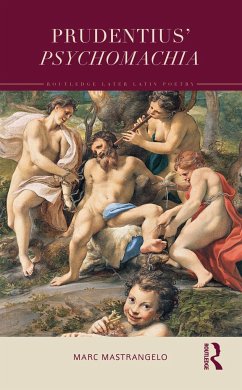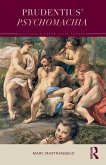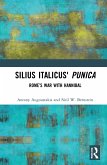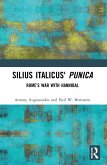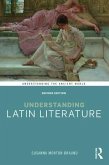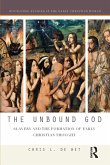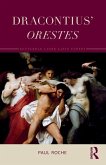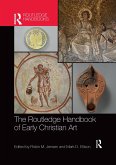This new translation brings to life Prudentius' Psychomachia, one of the most widely read poems in western Europe from Late Antiquity through the Renaissance. With accompanying notes and introduction, this volume provides a fresh exploration of its themes and influence.
The Psychomachia of Prudentius (348-c. 405), an allegorical epic poem of nearly 1,000 lines about the battle between the virtues and the vices for possession of the human soul, led early modern scholars to refer to the late antique poet as "the Christian Vergil." Combining depictions of violent, single combats with allusions to pagan epic poetry, biblical scenes, and Christian doctrine, the poem captures the dynamism of the later Roman Empire in which the pagan world was giving way to a new, Christian Europe. In this volume, the introduction sets the historical and literary context and illuminates the Psychomachia's prominent role in western literary history. Mastrangelo's translation aims to capture the rhetorical power of the author's Roman Christian Latin for the 21st-century reader. The notes provide the reader with in-depth information on Prudentius' Latinity, the Roman epic tradition, and Christian doctrine.
This volume is directed at students and scholars across the disciplines of comparative literature, classics, religion, and ancient and medieval studies, as well as any reader interested in the history and development of literature in the West.
The Psychomachia of Prudentius (348-c. 405), an allegorical epic poem of nearly 1,000 lines about the battle between the virtues and the vices for possession of the human soul, led early modern scholars to refer to the late antique poet as "the Christian Vergil." Combining depictions of violent, single combats with allusions to pagan epic poetry, biblical scenes, and Christian doctrine, the poem captures the dynamism of the later Roman Empire in which the pagan world was giving way to a new, Christian Europe. In this volume, the introduction sets the historical and literary context and illuminates the Psychomachia's prominent role in western literary history. Mastrangelo's translation aims to capture the rhetorical power of the author's Roman Christian Latin for the 21st-century reader. The notes provide the reader with in-depth information on Prudentius' Latinity, the Roman epic tradition, and Christian doctrine.
This volume is directed at students and scholars across the disciplines of comparative literature, classics, religion, and ancient and medieval studies, as well as any reader interested in the history and development of literature in the West.
"[T]his most welcome volume presents the Psychomachia of Prudentius... With great panache, Mastrangelo (Dickinson College) maintains the coloration and tone of the original Latin hexameters and admirably succeeds in graphically conveying the grisly atmospheric elements of the successive battles of the Virtues against the Vices. The translation is truly accessible to 21st-century readers... In addition, the book's excellent introduction and copious explanatory notes for each section of the poem effectively contextualize the allegory within its religious and cultural milieu and provide essential interpretive, philological, and historical instruction. Summing Up: Highly recommended." - CHOICE
"In general, Mastrangelo's new translation is most welcome... it makes Prudentius' most important and in-fluential work available on a new, modern footing, especially to students with little or no Latin. This is particularly important given the centrality of the Psychomachia to so much of later medieval literature: it is required reading for all scholars of medieval English, for instance, and it is a relief to be able to recommend a single well-annotated translation to a non-Latinist... I am full of admiration for Mastrangelo's work. His translation has done what all good translations ought to: it has made me rethink and revisit anew a text I thought I knew very well... This is the text I will be assigning when I teach the Psychomachia in translation from now on." - PLEKOS
"In general, Mastrangelo's new translation is most welcome... it makes Prudentius' most important and in-fluential work available on a new, modern footing, especially to students with little or no Latin. This is particularly important given the centrality of the Psychomachia to so much of later medieval literature: it is required reading for all scholars of medieval English, for instance, and it is a relief to be able to recommend a single well-annotated translation to a non-Latinist... I am full of admiration for Mastrangelo's work. His translation has done what all good translations ought to: it has made me rethink and revisit anew a text I thought I knew very well... This is the text I will be assigning when I teach the Psychomachia in translation from now on." - PLEKOS

